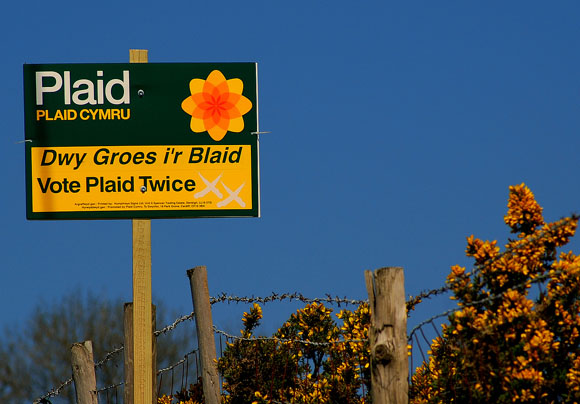
| Plaid
Plaid, formerly full Plaid Cymru � The Party of Wales, is the principal nationalist political party in Wales. It advocates the withdrawal of Wales from the United Kingdom and the establishment of an independent Welsh state, and the growth of the Welsh language and its associated culture. Support for Plaid is historically concentrated in the rural Welsh-speaking areas of north and west Wales. In the United Kingdom general election, 2005, the party's share of the vote in Wales was 14.3%.
Plaid has 1 of 4 Welsh seats in the European Parliament, 3 of 40 Welsh seats in the UK Parliament, 12 of 60 seats in the National Assembly for Wales, and control of 1 of 22 Welsh local authorities. According to accounts filed with the Electoral Commission for the year of 2004, the party has an income and expenditure of about �500,000. Its website claims a membership of about 8,000.
History
The party was founded as Plaid Genedlaethol Cymru (Welsh: National Party of Wales), on 5 August 1925, by members of Byddin Ymreolwyr Cymru, a nationalist party of north Wales, and Y Mudiad Cymreig, an underground nationalist movement. The party soon changed to the more familiar name, Plaid Cymru. In informal contexts, and spoken language, the name was regularly shortened to simply Y Blaid or the "Welsh nationalist party". On February 24, 2006, the word "Cymru" (Wales) was effectively dropped from the party's name. The name Plaid simply means "Party".
Plaid Cymru contested few elections in its early years, preferring to concentrate on the promotion of the Welsh language and its culture, reflecting a split in Welsh nationalism over the question of whether to prioritise the constitutional separation of Wales from the United Kingdom or the promotion of the Welsh language.
In 1966, however, Gwynfor Evans (then the party's President) became the first Plaid Cymru Member of Parliament, capturing the largely Welsh-speaking Carmarthen constituency from the Labour Party in a by-election. Evans lost the seat to Labour in 1970, but regained it in October 1974, during which time the party had gained a further two MPs from largely Welsh speaking areas.
Plaid Cymru retained this level of representation until 1979, when Carmarthen was again lost. More significantly, however, a referendum on Welsh devolution (or 'home rule') was heavily defeated. Despite Plaid Cymru's ambivalence toward home rule - as opposed to ouright independence - the referendum result led many in the party to question its existence.
In 1992, the party added a fourth MP, again from a Welsh speaking area. In 1997 a further referendum was won, establishing the National Assembly for Wales. Plaid Cymru became the main opposition to the ruling Labour group. In so doing it appeared to have broken out of its rural Welsh-speaking heartland, and captured supposedly strong Labour areas in industrial south Wales. At the second Welsh Assembly elections in 2003, however, all of these seats were lost to Labour.
Plaid Cymru in the Assembly era
The 1999 elections were seen as a breakthrough by the party, gaining seats in places where little or no Welsh was spoken � such as in the Rhondda and Islwyn. Many attributed this surge in support to the travails of the Labour Party, whose nomination for Assembly First Secretary, Ron Davies, was forced to stand down in an alleged sex scandal. The ensuing leadership battle did much to damage Labour (and thus aid Plaid Cymru who, by contrast, boasted a popular and high profile leader in Dafydd Wigley) after the UK Labour leadership was seen to interfere in the contest and deny the popular Rhodri Morgan victory.
Plaid Cymru's success, however, was short-lived: the Party's President, Dafydd Wigley resigned, citing health problems and amid rumours of a plot against him. His successor Ieuan Wyn Jones struggled to impose his authority, particularly over the controversy surrounding alleged anti-English comments from a local Plaid Cymru councillor, Seimon Glyn and continuing allegations of anti-English and anti-English language sentiment.
In the 2001 General Election, Plaid Cymru lost Wyn Jones' old seat of Ynys M�n to Albert Owen, but gained Carmarthen East and Dinefwr, electing Adam Price. The Assembly elections of May 2003 saw the party's representation fall from 17 to 12, with the spectacular 1999 gains such of Rhondda, Islwyn, Llanelli and Conwy reverting to Labour. Plaid Cymru narrowly remained the second-largest party in the National Assembly ahead of the Conservatives, Liberal Democrats and Forward Wales.
On 15 September 2003 folk-singer and county councillor Dafydd Iwan was elected Plaid Cymru's new President. Ieuan Wyn Jones, who had resigned from his dual role as President and Assembly group leader, was re-elected in the latter role. Elfyn Llwyd remained the Plaid Cymru leader in the Westminster Parliament. Although the party's constitution formally designated the post of President as "the Registered Leader of the party", in practice the three were promoted as joint leaders of the party, leading to some confusion. Some senior Plaid figures called for the party to find a single leader in the Assembly who could be presented to the electorate as a clear potential First Minister of Wales. Under Iwan's Presidency the party has formally adopted a policy of independence from the United Kingdom (a word the party resisted declaring for many years, its party founder Saunders Lewis having described it as a 'selfish' in the 1920s).
In the General Election of May 5, 2005, Plaid lost the Ceredigion seat to the Liberal Democrats, the result was a dissapointment to Plaid, who had hoped to gain Ynys M�n, whilst holding its four seats.
In 2006, the party voted constitutional changes to formally designate the party's leader in the assembly as its overall leader, with Ieuan Wyn Jones being restored to the full leadership and Dafydd Iwan becoming head of the voluntary wing of the party.
In the Welsh Assembly election of May 3, 2007, Plaid Cymru regained the Llanelli seat the party had lost to Labour in the 2003 election. The party also made gains on the regional lists, increasing its number of seats in the Welsh Assembly from 12 to 15. The 2007 election also saw Plaid Cymru's Mohammad Asghar become the first ethnic minority candidate elected to the Welsh Assembly. |

